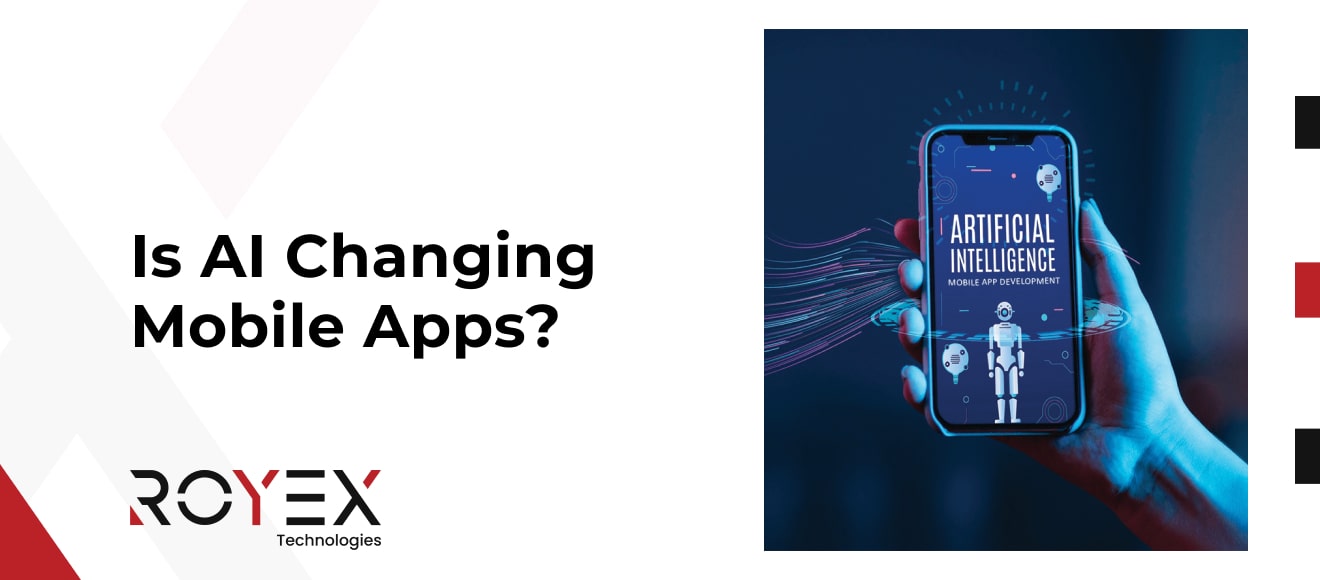
Is AI Changing Mobile Apps?
The world of mobile apps has been undergoing a rapid transformation, and at the heart of this change is Artificial Intelligence (AI). From personalized recommendations in e-commerce apps to voice-enabled assistants, predictive text, and intelligent chatbots, AI has completely redefined the way users interact with applications. In regions like the UAE and the wider Middle East, where smartphone penetration is among the highest in the world, the impact of AI on mobile apps is even more profound.
This article takes a deep dive into how AI is changing mobile apps, the key trends shaping the industry, adoption in the UAE and Middle East, its impact across industries, the challenges, and finally why working with the right partner like Royex Technologies is crucial if you’re looking for future-ready mobile app development in Dubai.
The AI Revolution in Mobile Apps
Artificial Intelligence is no longer a futuristic concept. Today, it powers apps that millions of people use daily—Netflix, Spotify, Amazon, Google Maps, and countless others. AI algorithms help these apps learn from user behavior, anticipate needs, and offer hyper-personalized experiences.
In the mobile app world, AI is being used in:
-
Natural Language Processing (NLP): Chatbots, voice assistants, and translation apps.
-
Machine Learning (ML): Predictive analytics, personalization engines, fraud detection.
-
Computer Vision: Facial recognition, AR filters, image scanning.
-
Recommendation Systems: E-commerce and content streaming platforms.
-
Intelligent Automation: Task management and workflow optimization.
These AI-driven innovations are not just making apps smarter—they are reshaping business models and creating entirely new customer experiences.
AI and the Middle East’s Digital Growth
The Middle East, particularly the UAE and Saudi Arabia, is rapidly embracing AI as part of national strategies:
-
UAE AI Strategy 2031 aims to position the UAE as a global leader in AI adoption.
-
Dubai has appointed the world’s first Minister of Artificial Intelligence.
-
AI-driven apps are powering everything from Dubai Smart Government services to fintech startups in Riyadh.
-
The AI market in the Middle East is expected to contribute over $320 billion to the regional economy by 2030.
Given the region’s high mobile adoption rate (UAE’s smartphone penetration is over 95%), AI-enabled mobile apps are becoming central to everyday life—whether for e-commerce, healthcare, logistics, or education.
How AI Is Transforming Mobile App Experiences
1. Hyper-Personalization
AI enables apps to adapt content, offers, and experiences for each user. For instance:
-
E-commerce apps in Dubai recommend products based on browsing history.
-
Food delivery apps use AI to predict what users are likely to order next.
-
Streaming platforms personalize movie and music recommendations.
Personalization directly boosts engagement, retention, and conversions.
2. Smarter Chatbots and Virtual Assistants
AI-powered chatbots are now central to customer support within mobile apps. They provide:
-
24/7 real-time support.
-
Multilingual communication (critical in the UAE’s diverse population).
-
Faster query resolution, reducing dependence on human agents.
For example, banks in the UAE use chatbots in their apps to answer balance queries, process transactions, and even give financial advice.
3. Voice and Speech Recognition
Voice assistants like Siri, Alexa, and Google Assistant have paved the way, but now AI-enabled speech recognition is being embedded into industry-specific apps.
-
Healthcare apps in Dubai allow doctors to dictate medical notes.
-
Logistics apps use voice-enabled features to help drivers update status hands-free.
-
Retail apps allow users to search by speaking instead of typing.
4. Enhanced App Security
AI plays a crucial role in identifying and preventing fraudulent activities:
-
Mobile banking apps in the Middle East use AI fraud detection to monitor unusual transactions.
-
Facial recognition and biometric authentication powered by AI ensure secure logins.
-
AI identifies vulnerabilities in real time to prevent hacking attempts.
In a region where mobile wallets and online banking are growing exponentially, AI security is essential.
5. Augmented Reality (AR) and Computer Vision
AI-powered AR is transforming industries like retail, real estate, and education:
-
Furniture retailers in the UAE use AR apps to let customers “see” furniture in their homes.
-
Real estate apps allow virtual property tours with AI-driven visualization.
-
Education apps use AI-based computer vision to create interactive learning experiences.
6. Predictive Analytics
AI enables mobile apps to anticipate what users want:
-
Retail apps predict when a customer may reorder a product.
-
Travel apps suggest flights and hotels based on browsing and booking history.
-
Fitness apps predict progress and recommend personalized workout routines.
This not only enhances user satisfaction but also maximizes ROI for businesses.
7. Smarter Recommendations in E-Commerce
E-commerce apps in the UAE, where mobile shopping accounts for nearly 70% of total e-commerce transactions, rely heavily on AI for:
-
Personalized product suggestions.
-
Dynamic pricing strategies.
-
Inventory optimization.
AI helps businesses boost sales while ensuring customers find what they want faster.
AI in Different Industries Through Mobile Apps
1. Banking & Fintech
Fintech is exploding in the Middle East. AI in fintech apps enables:
-
Fraud detection and prevention.
-
AI chatbots offering financial advice.
-
Personal financial management (spending insights, savings suggestions).
Mobile-first banking has become the norm in the UAE, and AI plays a critical role in building user trust.
2. Healthcare
Mobile health apps are increasingly powered by AI:
-
Predictive diagnostics based on symptoms entered into apps.
-
AI chatbots providing medical advice.
-
Remote monitoring of patient health via wearables synced with mobile apps.
In Dubai, telemedicine apps surged during the pandemic and continue to thrive thanks to AI.
3. Retail & E-Commerce
AI-powered apps are changing the retail experience:
-
Virtual try-on for clothes and accessories.
-
Personalized shopping journeys.
-
Intelligent search results based on image recognition.
Given the UAE’s e-commerce boom (expected to surpass $10 billion by 2025), AI is essential to remain competitive.
4. Transportation & Logistics
AI in transportation apps ensures:
-
Smarter route optimization (reducing delivery times in congested Dubai).
-
Predictive vehicle maintenance.
-
Real-time tracking with anomaly detection for delays.
5. Real Estate
AI-driven real estate apps provide:
-
Virtual property tours.
-
Price prediction based on historical data.
-
Chatbots guiding property seekers.
Dubai’s thriving real estate market increasingly depends on such innovations.
6. Education
Mobile learning apps in the Middle East now use AI to:
-
Personalize learning paths.
-
Provide intelligent tutoring.
-
Translate content instantly for multilingual users.
The Challenges of AI in Mobile Apps
While AI brings numerous opportunities, businesses face challenges such as:
-
High development costs: AI integration requires specialized expertise.
-
Data privacy: With UAE’s data protection laws, businesses must be cautious about how data is collected and used.
-
Complexity: Implementing AI requires continuous updates and training of models.
-
Bias and Fairness: AI systems must be designed to avoid bias in recommendations or decision-making.
The Future of AI in Mobile Apps
By 2030, mobile apps will be almost entirely AI-powered. Some future trends include:
-
Emotion AI: Apps that detect emotions through facial recognition and tone of voice.
-
Edge AI: Processing data on-device instead of sending it to servers, improving speed and privacy.
-
Conversational AI: Apps becoming more like companions than tools.
-
Hyper-Automation: AI automating entire processes across industries.
For businesses in the UAE, adopting AI in mobile apps is no longer optional—it’s a strategic necessity.
Why UAE Businesses Should Prioritize AI in Mobile Apps
-
Consumer Expectation: UAE consumers expect convenience and personalization in every app.
-
Government Push: Dubai is heavily investing in AI-driven initiatives across industries.
-
Competitive Advantage: AI-powered apps help businesses stand out in crowded markets.
-
Increased ROI: AI enhances user retention, reduces churn, and drives higher engagement.
Why Royex Is the Best Choice for Mobile App Development in Dubai
When it comes to mobile app development in Dubai, choosing the right partner makes all the difference. Royex Technologies is a leading name in the UAE, offering AI-powered mobile app development that helps businesses stay ahead of the curve.
Here’s why Royex is your ideal choice:
-
AI Integration Expertise
Royex specializes in embedding AI features such as chatbots, recommendation engines, predictive analytics, and computer vision into mobile apps. -
Security-First Approach
We ensure compliance with UAE data protection regulations and international standards, safeguarding user trust. -
Customized Solutions
Every business is unique, and so are our apps. We design AI-driven apps tailored to your business model and target audience. -
Proven Track Record
With over a decade of experience and hundreds of successful apps, we are trusted by enterprises and startups across Dubai and the Middle East. -
Local Presence, Global Vision
Based in Dubai, we understand the regional market while delivering apps that meet global standards. -
Continuous Support
Our relationship doesn’t end at launch—we provide ongoing updates, optimizations, and AI model training.
Conclusion
Artificial Intelligence is not just changing mobile apps—it is revolutionizing them. From personalization and predictive analytics to chatbots, voice recognition, and AR, AI is making apps smarter, more secure, and more engaging. In the UAE and wider Middle East, where digital adoption is accelerating, AI-enabled apps are essential for businesses to thrive in a competitive landscape.
For businesses looking to harness the full power of AI, choosing the right development partner is critical. With its expertise, innovation, and proven track record, Royex Technologies is the best choice for mobile app development in Dubai. By combining cutting-edge AI with robust security and user-centric design, Royex ensures your app is not just future-ready—but future-proof.





